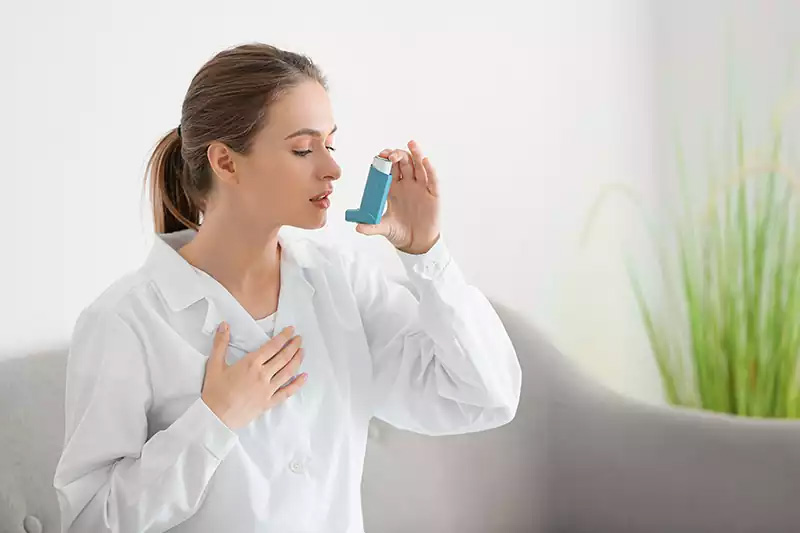Asthma
Asthma is a condition which affects the lungs and causes the airways to get swollen and small, making it hard to breathe.
Severe asthma can make it difficult to talk or be active.
Some people call asthma, “bronchial asthma.”
Symptoms
There are three main signs of asthma:
- Blockage of the airway.
When you breathe normally, the muscle bands around your airways are relaxed, and the air flows freely. But the muscles tighten when you have asthma, and it is harder for the air to get in.
- Inflammation.
Asthma causes red, swollen bronchial tubes in the lungs.
This inflammation will cause damage to your lungs.
The key to dealing with this is Asthma treatment in the long term.
- Irritability of the airway.
Individuals with asthma have fragile airways that appear to overreact and narrow when they come into contact with even mild stimuli.
The above symptoms may lead to:
- Repeated coughing, especially in the night or in the morning
- Wheezing, a whistling sound while you’re breathing
- Breath shortness
- Tightness, discomfort, or pressure in the chest
- Trouble sleeping due to breathing issues
Types of Asthma
Adult-initiated asthma.
Asthma can begin at any age; however, it is more common in people younger than 40.
Asthmaticus.
These long-lasting asthma attacks do not go away unless you use bronchodilators.
It’s a medical emergency that needs care right away.
Exercise-induced asthma.
It occurs during physical activity, when you breathe in air that’s drier than what’s in your body, and your airways are narrower. Exercise-induced asthma may also affect people who do not have asthma. You will experience symptoms within a few minutes of beginning your workout, and they may last 10 to 15 minutes after you stop.
Allergic asthma
Things that activate allergies, such as dust, pollen and pet dander, can also cause asthma attacks.
Non-allergic asthma.
This form flares in severe weather conditions. It might be during the summer heat or the cold of the winter. It may even turn up when you’re depressed or cold.
Occupational asthma.
It typically affects people working with chemical fumes, dust, or other unpleasant materials.
Eosinophilic asthma,
This extreme form is characterized by high levels of white blood cells called eosinophils. It typically affects adults between 35 and 50 years.
Nocturnal Asthma
The symptoms of asthma typically get worse at night
Cough-variant Asthma
The only symptom is a long term-cough.
Causes and triggers of Asthma
- Infections like sinusitis, colds, and flu
- Allergens such as pollen, mould, pet dander, and dust mites
- Irritants such as heavy perfume odours or cleaning solutions
- The toxicity of the air
- Smoke of tobacco
- Exercise
- Cold air or changes in weather conditions such as temperature or humidity;
- Gastroesophageal reflux (GERD) disease
- Powerful feelings like fear, excitement, sorrow, or tension
Treatment
Asthma is usually treated with an inhaler, a small device that lets you breathe in medicines.
The treatments are as follows:
- Reliever inhalers – used when needed to alleviate symptoms of asthma for a limited time rapidly.
- Preventer inhalers Are used regularly to reduce signs of asthma.
Some people may need medication prescribed by the doctor.
Home remedies
Medication will probably be vital in getting your asthma under control, but one can do some things at home to help.
- Avoid asthma triggers.
- Exercise frequently.
- Keep a healthy weight.
- Look after conditions that can trigger symptoms, such as GERD.
- Practice breathing exercises to ease symptoms, so less medication is required.





